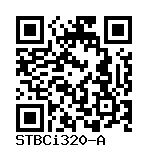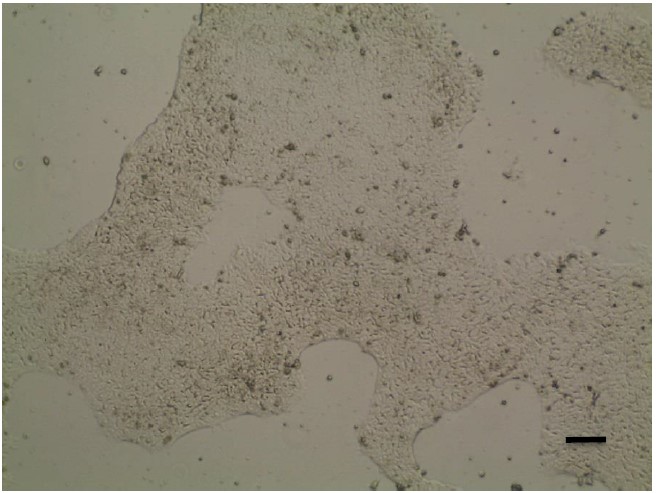SFC031-03-03
STBCi320-A
General
Cell Line |
|
| hPSCreg name | STBCi320-A |
| Cite as: | STBCi320-A (RRID:CVCL_WU51) |
| Alternative name(s) |
SFC031-03-03
|
| Cell line type | Human induced pluripotent stem cell (hiPSC) |
| Similar lines |
CBIGi039-A-1 (IPSC0051, LRRK2 R1441H(CBIGi039-A) correction) Donor's gene variants: LRRK2, LRRK2 Donor diseases: Parkinson Disease CBIGi041-A-1 (IPSC0054, GBA L444P (CBIGi041-A) correction) Donor's gene variants: GBA, GBA Donor diseases: Parkinson Disease CBIGi042-A-1 (GBA E326K (CBIGi042-A) correction, IPSC0056) Donor's gene variants: GBA, GBA Donor diseases: Parkinson Disease CBIGi044-A-1 (IPSC0059, LRRK2 N551K (CBIGi044-A) correction) Donor's gene variants: LRRK2, LRRK2 Donor diseases: Parkinson Disease CBIGi044-A-2 (IPSC0060, LRRK2 R1398H (CBIGi044-A) correction) Donor's gene variants: LRRK2, LRRK2 Donor diseases: Parkinson Disease EDi001-A-2 (AST23-1KO-3, AST22-1KO-3, AST-23_SCAKO Clone 3, AST-22_SNCAKO Clone 3) Donor's gene variants: SNCA, SNCA, SNCA, SNCA Donor diseases: Parkinson disease EDi001-A-3 (AST23_SNCAKO Clone 1, AST22-1KO-1, AST23-1KO-1, AST22_SNCAKO Clone 1) Donor's gene variants: SNCA, SNCA, SNCA, SNCA Donor diseases: Parkinson disease EDi001-A-4 (AST22-2KO-6, AST23_SNCAKO Clone 6, AST22_SNCAKO Clone 6, AST23-2KO-6) Donor's gene variants: SNCA, SNCA, SNCA, SNCA Donor diseases: Parkinson disease ZZUi007-A (ZZU-iPS-PD-CHCHD2-001) Donor's gene variants: CHCHD2 Donor diseases: obsolete_Parkinson's disease |
| Last update | 24th October 2024 |
| User feedback | |
Provider |
|
| Generator | StemBANCC (STBC) |
| Distributors | |
External Databases |
|
| BioSamples | SAMEA5859484 |
| EBiSC | STBCi320-A |
| Cellosaurus | CVCL_WU51 |
| Wikidata | Q98132854 |
General Information |
|
| * Is the cell line readily obtainable for third parties? |
Yes Research use: allowed
Clinical use: not allowed
Commercial use: not allowed
|
Donor Information
General Donor Information |
|
| Sex | male |
| Age of donor (at collection) | 55-59 |
Phenotype and Disease related information (Donor) |
|
| Diseases | A disease was diagnosed.
|
External Databases (Donor) |
|
| BioSamples | SAMEA5859483 |
Ethics
| Has informed consent been obtained from the donor of the embryo/tissue from which the pluripotent stem cells have been derived? | Yes |
| Was the consent voluntarily given? | Yes |
| Has the donor been informed that participation will not directly influence their personal treatment? | Yes |
| Can you provide us with a copy of the Donor Information Sheet provided to the donor? | Yes |
| Do you (Depositor/Provider) hold the original Donor Consent Form? | Yes |
| Is there other documentation provided to the donor for consenting purposes? | No |
| Confirm that consent was obtained by a qualified professional | Yes |
| Please indicate whether the data associated with the donated material has been pseudonymised or anonymised. | pseudonymised |
| Does consent explicitly allow the derivation of pluripotent stem cells? | Yes |
| * Does consent pertain to a specific research project? | No |
| Does consent permit unforeseen future research, without further consent? | Yes |
| Does consent expressly prevent development of commercial products? | No |
| Does consent expressly prevent financial gain from any use of the donated embryo/tissue, including any product made from it? | Yes |
| Does consent prevent the DONATED BIOSAMPLE from being made available to researchers anywhere in the world? | No |
| Does consent prevent CELLS DERIVED FROM THE DONATED BIOSAMPLE from being made available to researchers anywhere in the world? | No |
Does consent permit research by | |
| an academic institution? | Yes |
| a public organisation? | Yes |
| a non-profit company? | Yes |
| a for-profit corporation? | Yes |
| How may genetic information associated with the cell line be accessed? | Controlled Access |
| Will the donor expect to receive financial benefit, beyond reasonable expenses, in return for donating the biosample? | No |
| Does the consent permit the donor, upon withdrawal of consent, to stop the use of the derived cell line(s) that have already been created from donated samples? | No |
| Does the consent permit the donor, upon withdrawal of consent, to stop delivery or use of information and data about the donor? | No |
| Has a favourable opinion been obtained from a research ethics committee, or other ethics review panel, in relation to the Research Protocol including the consent provisions? | Yes |
| Name of accrediting authority involved? | NRES Committee South Central - Hampshire A |
| Approval number | 13/SC/0179 |
| Has a favourable opinion been obtained from a research ethics committee, or other ethics review panel, in relation to the PROPOSED PROJECT, involving use of donated embryo/tissue or derived cells? | Yes |
| Name of accrediting authority involved? | NRES Committee South Central - Hampshire A |
| Approval number | 13/SC/0179 |
| Do you have obligations to third parties in regard to the use of the cell line? | Yes |
| Please describe: | DNA sequencing can only be performed for research into donors specified condition. Material shall not be sold, transplanted into any human being or used to create egg or sperm cells (gametes) or embryos. The material shall not be used for direct exploitation. For the purposes of this, Direct exploitation means to develop for commericalization or to commercialize the Material. |
| Are you aware of any further constraints on the use of the donated embryo/tissue or derived cells? | No |
| For generation of the cell line, who was the supplier of any recombined DNA vectors or commercial kits used? | |
hIPSC Derivation
General |
|
| Source cell type |
A connective tissue cell which secretes an extracellular matrix rich in collagen and other macromolecules. Flattened and irregular in outline with branching processes; appear fusiform or spindle-shaped.; These cells may be vimentin-positive, fibronectin-positive, fsp1-positive, MMP-1-positive, collagen I-positive, collagen III-positive, and alpha-SMA-negative.
|
| Age of donor (at collection) | 55-59 |
| Passage number reprogrammed | 3 |
Reprogramming method |
|
| Vector type | Non-integrating |
| Vector | Sendai virus |
| Genes | |
| Is reprogramming vector detectable? |
No |
| Methods used |
PCR
|
| Notes on reprogramming vector detection | Cytotune 2.0 |
| Files and images showing reprogramming vector expressed or silenced | |
Vector free reprogramming |
|
Other |
|
| Derived under xeno-free conditions |
No |
| Derived under GMP? |
No |
| Available as clinical grade? |
No |
Culture Conditions
| Surface coating | Matrigel/Geltrex |
| Feeder cells |
No |
| Passage method |
Enzyme-free cell dissociation
EDTA
|
| O2 Concentration | 21 % |
| CO2 Concentration | 5 % |
| Medium |
mTeSR™ 1
|
Characterisation
Analysis of Undifferentiated Cells
| Marker | Expressed | Immunostaining | RT-PCR | Flow Cytometry | Enzymatic Assay | Expression Profiles |
| TRA 1-60 |
Yes |
|||||
| NANOG |
Yes |
Microbiology / Virus Screening |
|
| Mycoplasma | Negative |
Certificate of Analysis |
|
| Is there a certificate of analysis available? |
Yes
Passage:
|
Genotyping
Karyotyping (Cell Line) |
|
| Has the cell line karyotype been analysed? |
Yes
Identity to parent fibroblasts confirmed. Normal karyotype..
Passage number: 10
Karyotyping method:
Molecular karyotyping by SNP array
http:// |
Other Genotyping (Cell Line) |
|



Login to share your feedback, experiences or results with the research community.